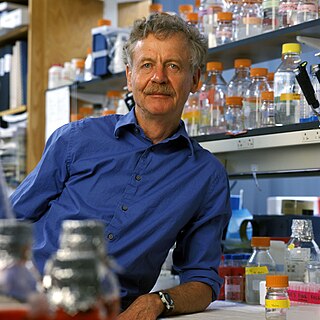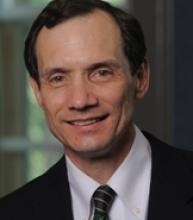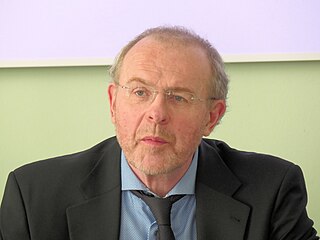
Paul Ehrlich was a Nobel Prize-winning German physician and scientist who worked in the fields of hematology, immunology and antimicrobial chemotherapy. Among his foremost achievements were finding a cure for syphilis in 1909 and inventing the precursor technique to Gram staining bacteria. The methods he developed for staining tissue made it possible to distinguish between different types of blood cells, which led to the ability to diagnose numerous blood diseases.
Tak Wah Mak, is a Canadian medical researcher, geneticist, oncologist, and biochemist. He first became widely known for his discovery of the T-cell receptor in 1983 and pioneering work in the genetics of immunology. In 1995, Mak published a landmark paper on the discovery of the function of the immune checkpoint protein CTLA-4, thus opening the path for immunotherapy/checkpoint inhibitors as a means of cancer treatment. Mak is also the founder of Agios Pharmaceuticals, whose lead compound, IDHIFA®, was approved by the FDA for acute myeloid leukemia in August 2017, becoming the first drug specifically targeting cancer metabolism to be used for cancer treatment. He has worked in a variety of areas including biochemistry, immunology, and cancer genetics.

The Gottfried Wilhelm Leibniz Prize, or Leibniz Prize, is awarded by the German Research Foundation to "exceptional scientists and academics for their outstanding achievements in the field of research". Since 1986, up to ten prizes have been awarded annually to individuals or research groups working at a research institution in Germany or at a German research institution abroad. It is considered the most important research award in Germany.

Rudolf Jaenisch is a Professor of Biology at MIT and a founding member of the Whitehead Institute for Biomedical Research. He is a pioneer of transgenic science, in which an animal’s genetic makeup is altered. Jaenisch has focused on creating genetically modified mice to study cancer, epigenetic reprogramming and neurological diseases.
Emil Raphael Unanue was a Cuban-American immunologist and Paul & Ellen Lacy Professor Emeritus at Washington University School of Medicine. He is a member of the National Academy of Sciences, the American Academy of Arts and Sciences and the Institute of Medicine. He previously served as chair of the National Academy of Sciences Section of Microbiology and Immunology.
The Robert Koch Medal and Award are two prizes awarded annually by the German Robert Koch Foundation for excellence in the biomedical sciences. These awards grew out of early attempts by German physician Robert Koch to generate funding to support his research into the cause and cure for tuberculosis. Koch discovered the bacteria responsible for the dreaded disease and rapidly acquired international support, including 500,000 gold marks from the Scottish-American philanthropist Andrew Carnegie.

Harald von Boehmer was a German-Swiss immunologist and author best known for his work on T cells.

Cluster of differentiation CD79A also known as B-cell antigen receptor complex-associated protein alpha chain and MB-1 membrane glycoprotein, is a protein that in humans is encoded by the CD79A gene.

Philippe J. Sansonetti is a French microbiologist, professor at the Pasteur Institute and the Collège de France in Paris. He is the director of the Inserm Unit 786 and of the Institut Pasteur laboratory Pathogénie Microbienne Moléculaire.
The Körber European Science Prize is presented annually by the Körber Foundation in Hamburg honoring outstanding scientists working in Europe for their promising research projects. The prize is endowed with one million euro and promotes research projects in the life sciences and physical sciences.
Frederick W. Alt is an American geneticist. He is a member of the Immunology section of the National Academy of Sciences and a Charles A. Janeway Professor of Pediatrics, and Professor of Genetics at Harvard Medical School. He is the Director of the Program in Cellular and Molecular Medicine at the Boston Children's Hospital. He is a Howard Hughes Medical Institute investigator, since 1987.

Ernst-Ludwig Winnacker is a German geneticist, biochemist and research manager. His main fields of research are virus/cell interaction, the mechanisms of gene expression in higher cells and prion diseases. He was President of the German Research Foundation and Secretary General of the European Research Council and is Secretary General of the Human Frontier Science Program Organization.

Peter Heinrich Krammer is a German immunologist and one of the directors of The National Center for Tumor Diseases (NCT), as well as the head of the Division Immunogenetics at the German Cancer Research Center (DKFZ) in Heidelberg. Peter H. Krammer is well known for his research and findings in apoptosis. He and his lab members discovered the CD95 receptor and many other molecules involved in signaling through the CD95 receptor.
The Max Delbrück Medal has been awarded annually from 1992 to 2013 by the Max Delbrück Center for Molecular Medicine. Named after the German biophysicist Max Delbrück, it is presented in Berlin to an outstanding scientist on the occasion of the annual "Berlin Lecture on Molecular Medicine", which the MDC organizes together with other Berlin research institutions and Bayer HealthCare. The award recipient usually delivers a lecture after the award.

Shimon Sakaguchi is an immunologist and a Distinguished Professor of Osaka University. He is best known for the discovery of regulatory T cells and to describe their role in the immune system. This discovery is used in the treatment of cancer and autoimmune diseases.
The Novartis Prizes for Immunology were established in 1990 by Sandoz to honour outstanding research in immunology, and expanded to their current form in 1992. Prizes for basic and clinical immunology are awarded every 3 years. A special prize was awarded in 2004.

Nikolaus Rajewsky is a German system biologist at the Max-Delbrück-Center for Molecular Medicine (MDC) and at the Charité in Berlin. He founded and directs the “Berlin Institute for Medical Systems Biology”. He leads the Rajewsky lab, where he studies how RNA regulates gene expression. He also co-chairs LifeTime, a pan-European research initiative of more than 90 academic institutions and 70 companies, which aims to revolutionize healthcare by mapping, understanding, and targeting cells during disease progression. LifeTime integrates several technologies: single-cell multiomics, machine learning, and personalized disease models such as organoids. Rajewsky has received numerous awards and honors, including the most prestigious German award, the Gottfried Wilhelm Leibniz Prize, endowed with 2.5 million euros by the German Research Foundation (DFG).

Dr. Michael J. Lenardo, is the chief of the Molecular Development and Immune System Section and the founder and co-Director of the Clinical Genomics Program at the National Institute of Allergy and Infectious Disease (NIAID), National Institutes of Health (NIH). Trained as a geneticist, molecular biologist, and immunologist, his research examines how cells of the immune system defend themselves against various pathogens, including viruses and bacteria. His research has investigated genetic abnormalities in the immune system, mechanisms of cell death, genetic diseases of immune homeostasis and autoimmunity, and development of novel diagnostics and therapeutics for diseases of the immune system. Lenardo's contributions to science and medicine have shown the possibilities of genomic research in developing precision medicine diagnoses and treatments for disease in humans. In 2006 he was appointed Officer of the Most Excellent Order of the British Empire (O.B.E.) by Queen Elizabeth II. In 2019 he was inducted into the National Academies of Sciences and the National Academy of Medicine, considered among the highest honors awarded to a U.S scientist and medical researcher respectively.

Thomas Boehm is a German immunologist. He is a Director of the Max Planck Institute for Immunobiology and Epigenetics in Freiburg im Breisgau. He has won a variety of prizes for his research work.
Paweł Kisielow is a Polish biologist who specializes in immunology. He is best known for his research on T cells. He is a corresponding member of the Polish Academy of Sciences and a member of the Polish Academy of Arts and Sciences.












